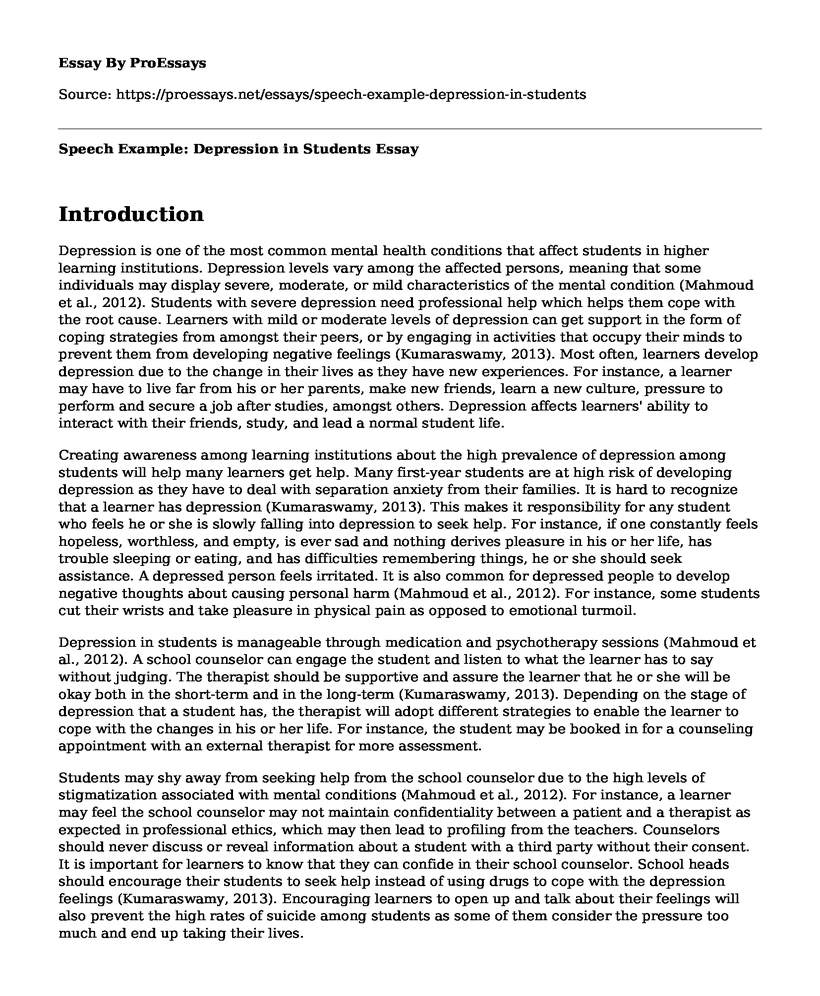Introduction
Depression is one of the most common mental health conditions that affect students in higher learning institutions. Depression levels vary among the affected persons, meaning that some individuals may display severe, moderate, or mild characteristics of the mental condition (Mahmoud et al., 2012). Students with severe depression need professional help which helps them cope with the root cause. Learners with mild or moderate levels of depression can get support in the form of coping strategies from amongst their peers, or by engaging in activities that occupy their minds to prevent them from developing negative feelings (Kumaraswamy, 2013). Most often, learners develop depression due to the change in their lives as they have new experiences. For instance, a learner may have to live far from his or her parents, make new friends, learn a new culture, pressure to perform and secure a job after studies, amongst others. Depression affects learners' ability to interact with their friends, study, and lead a normal student life.
Creating awareness among learning institutions about the high prevalence of depression among students will help many learners get help. Many first-year students are at high risk of developing depression as they have to deal with separation anxiety from their families. It is hard to recognize that a learner has depression (Kumaraswamy, 2013). This makes it responsibility for any student who feels he or she is slowly falling into depression to seek help. For instance, if one constantly feels hopeless, worthless, and empty, is ever sad and nothing derives pleasure in his or her life, has trouble sleeping or eating, and has difficulties remembering things, he or she should seek assistance. A depressed person feels irritated. It is also common for depressed people to develop negative thoughts about causing personal harm (Mahmoud et al., 2012). For instance, some students cut their wrists and take pleasure in physical pain as opposed to emotional turmoil.
Depression in students is manageable through medication and psychotherapy sessions (Mahmoud et al., 2012). A school counselor can engage the student and listen to what the learner has to say without judging. The therapist should be supportive and assure the learner that he or she will be okay both in the short-term and in the long-term (Kumaraswamy, 2013). Depending on the stage of depression that a student has, the therapist will adopt different strategies to enable the learner to cope with the changes in his or her life. For instance, the student may be booked in for a counseling appointment with an external therapist for more assessment.
Students may shy away from seeking help from the school counselor due to the high levels of stigmatization associated with mental conditions (Mahmoud et al., 2012). For instance, a learner may feel the school counselor may not maintain confidentiality between a patient and a therapist as expected in professional ethics, which may then lead to profiling from the teachers. Counselors should never discuss or reveal information about a student with a third party without their consent. It is important for learners to know that they can confide in their school counselor. School heads should encourage their students to seek help instead of using drugs to cope with the depression feelings (Kumaraswamy, 2013). Encouraging learners to open up and talk about their feelings will also prevent the high rates of suicide among students as some of them consider the pressure too much and end up taking their lives.
Conclusion
Students suffer from depression and it affects their academic performance. Understanding the symptoms of depression and taking necessary steps to seek help will enable learners to cope with both internal and external pressures in school. Creating awareness among learners is important. It creates a conducive environment for learners to speak out. Depression is manageable once recognized in the early stages. Learners should take part in sports or other school activities to keep their minds occupied.
References
Kumaraswamy, N. (2013). Academic stress, anxiety and depression among college students-a brief review. International review of social sciences and humanities, 5(1), 135-143.
Mahmoud, J. S. R., Staten, R. T., Hall, L. A., & Lennie, T. A. (2012). The relationship among young adult college students' depression, anxiety, stress, demographics, life satisfaction, and coping styles. Issues in mental health nursing, 33(3), 149-156.
Cite this page
Speech Example: Depression in Students. (2022, Nov 08). Retrieved from https://proessays.net/essays/speech-example-depression-in-students
If you are the original author of this essay and no longer wish to have it published on the ProEssays website, please click below to request its removal:
- The Impact of International Studies in Faculty Development
- Evaluating the Professionalism of Real Estate Agents Paper Example
- The Myth of Holding Anger in versus Expressing - Essay Sample
- Beating Depression - Essay Sample
- Identification and Prevention of PTSD in Adolescents - Essay Sample
- Essay Example on Tracking Physical Growth: Key to Understanding Children's Cognitive Development
- Free Paper Sample on Overcoming Tragedy: My Story of Transformation







